NBDPN recognizes the month of January as National Birth Defects Awareness Month (BDAM).
This year's theme is: EVERY JOURNEY MATTERS.
This January and throughout the year, join NBDPN to raise awareness about birth defects. Let’s help improve the health of people living with these conditions and widen the available network of support. This is the time to shine a light on various efforts within the birth defects community that:
As the National Birth Defects Prevention Network, we fully acknowledge that not all birth defects can be prevented.* Yet, we also know that there are certain behaviors before and during pregnancy that may be linked to an increased risk for birth defects. We strive to promote healthy choices that increase the chances of having a healthy pregnancy, and in turn, reduce the risks of pregnancy complications and/or birth defects.
Please see the sections below for the 2024 BDAM TOOLKIT, which include:
MARK YOUR CALENDARS AND JOIN US!!!
JANUARY 17th at 2pm (Eastern) for a special Birth Defects Awareness Month podcast listening session (in partnership with MotherToBaby). This podcast features NBDPN member and CMV mom, Amanda Devereaux. Listen with other network members and get your questions answered live!
Register here to attend the listening session and be sure to download the episode once it is released on the MotherToBaby website.
Please visit our partners' sites shared below to learn more.
Please visit our partners' sites shared below to learn more.
Please visit our partners' sites shared below to learn more.
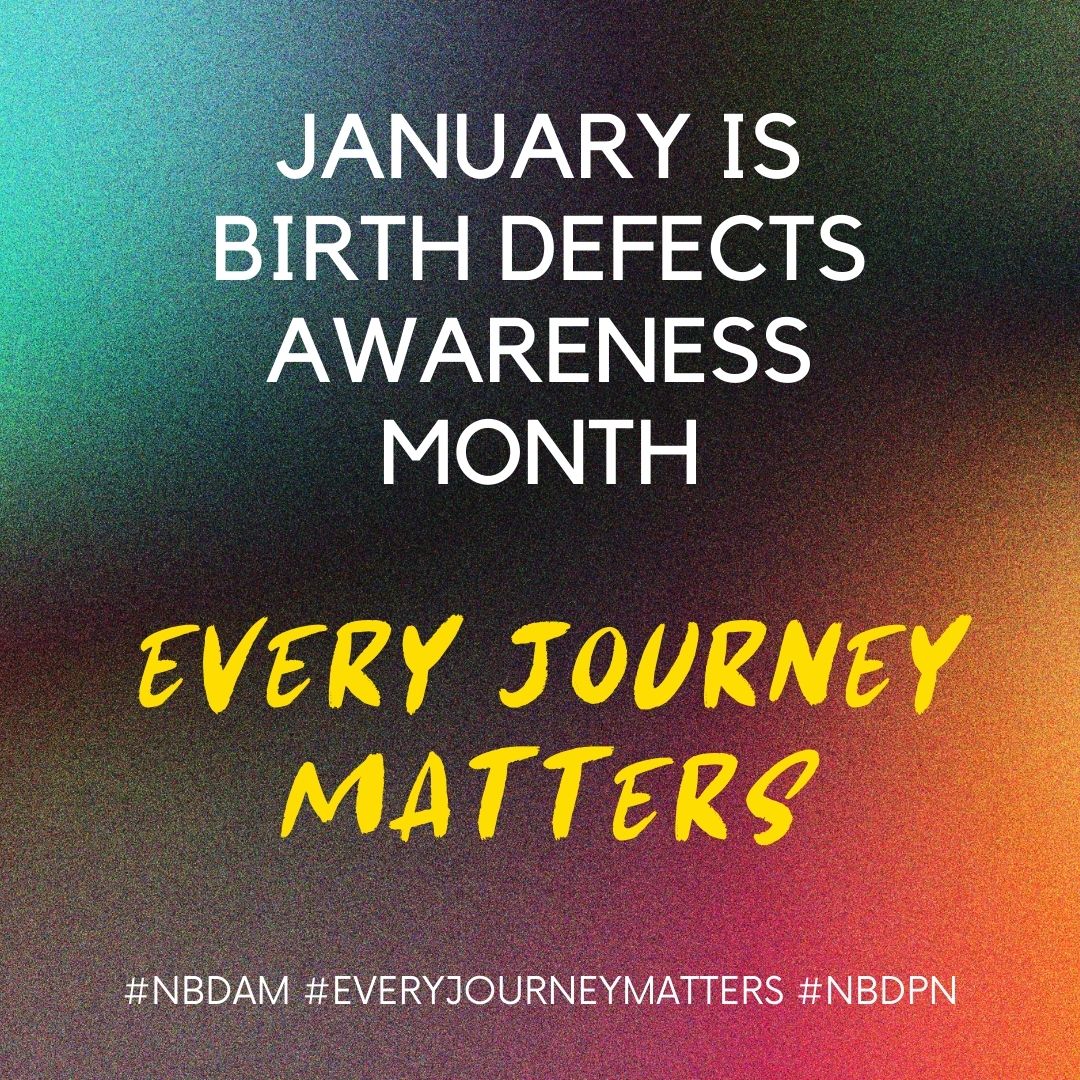
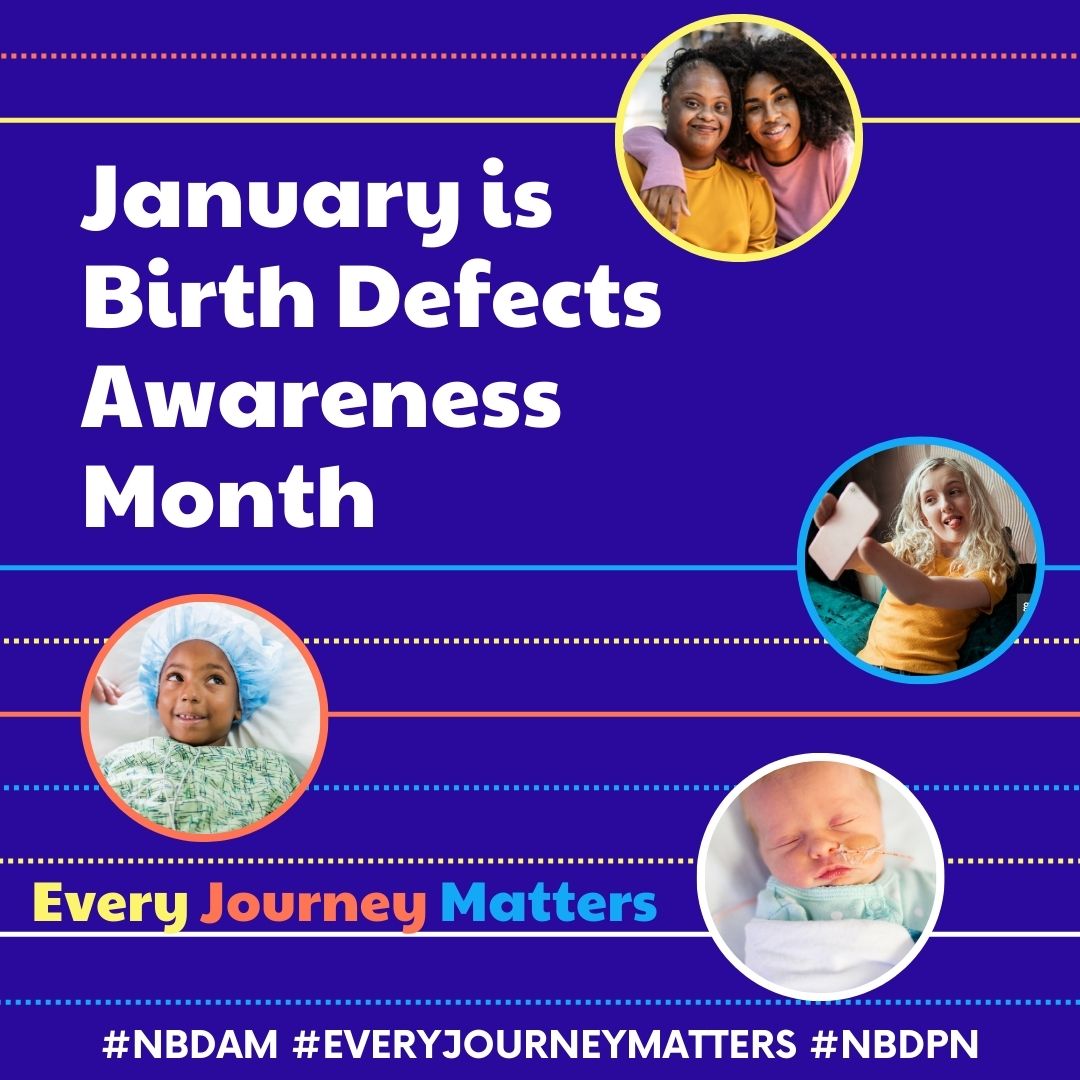
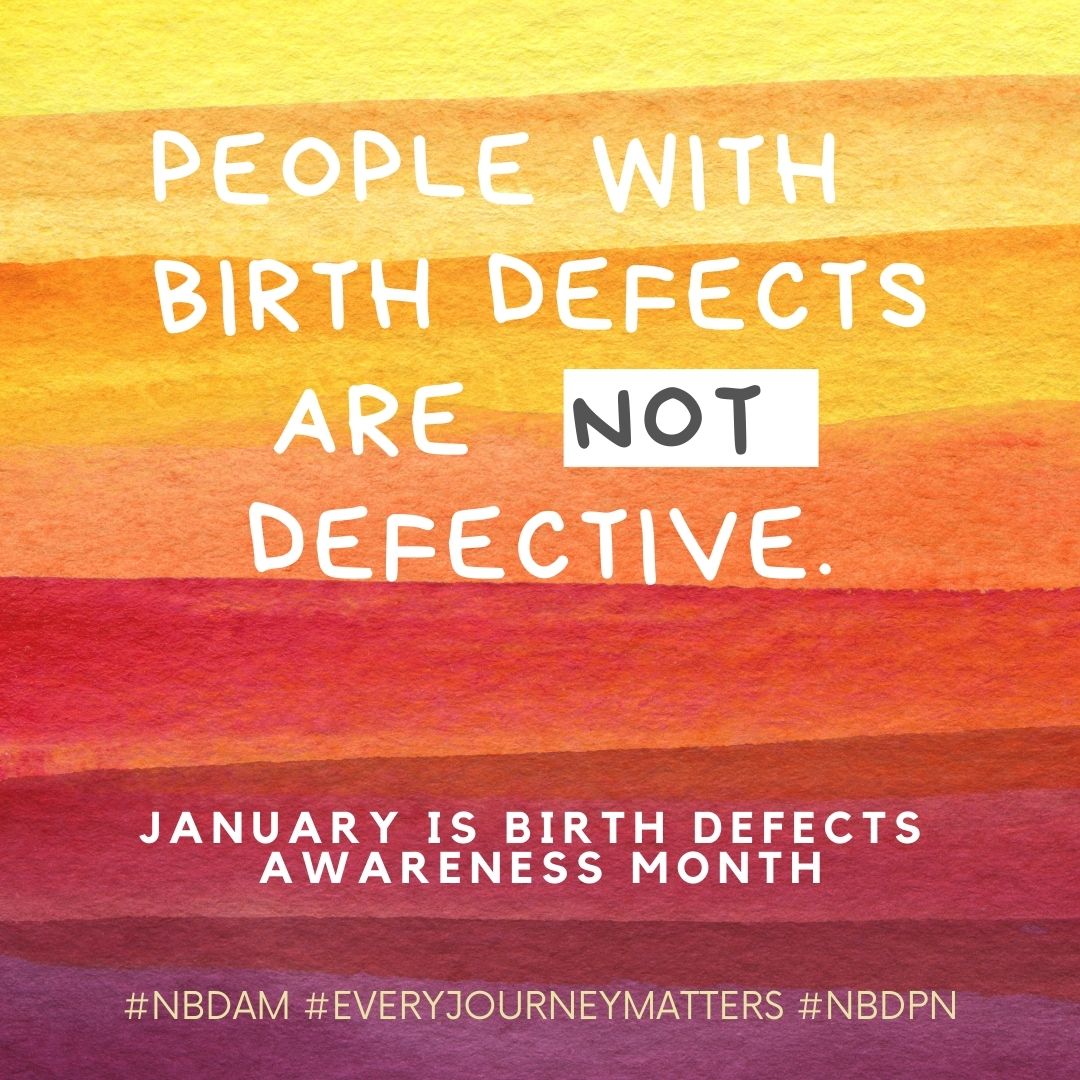
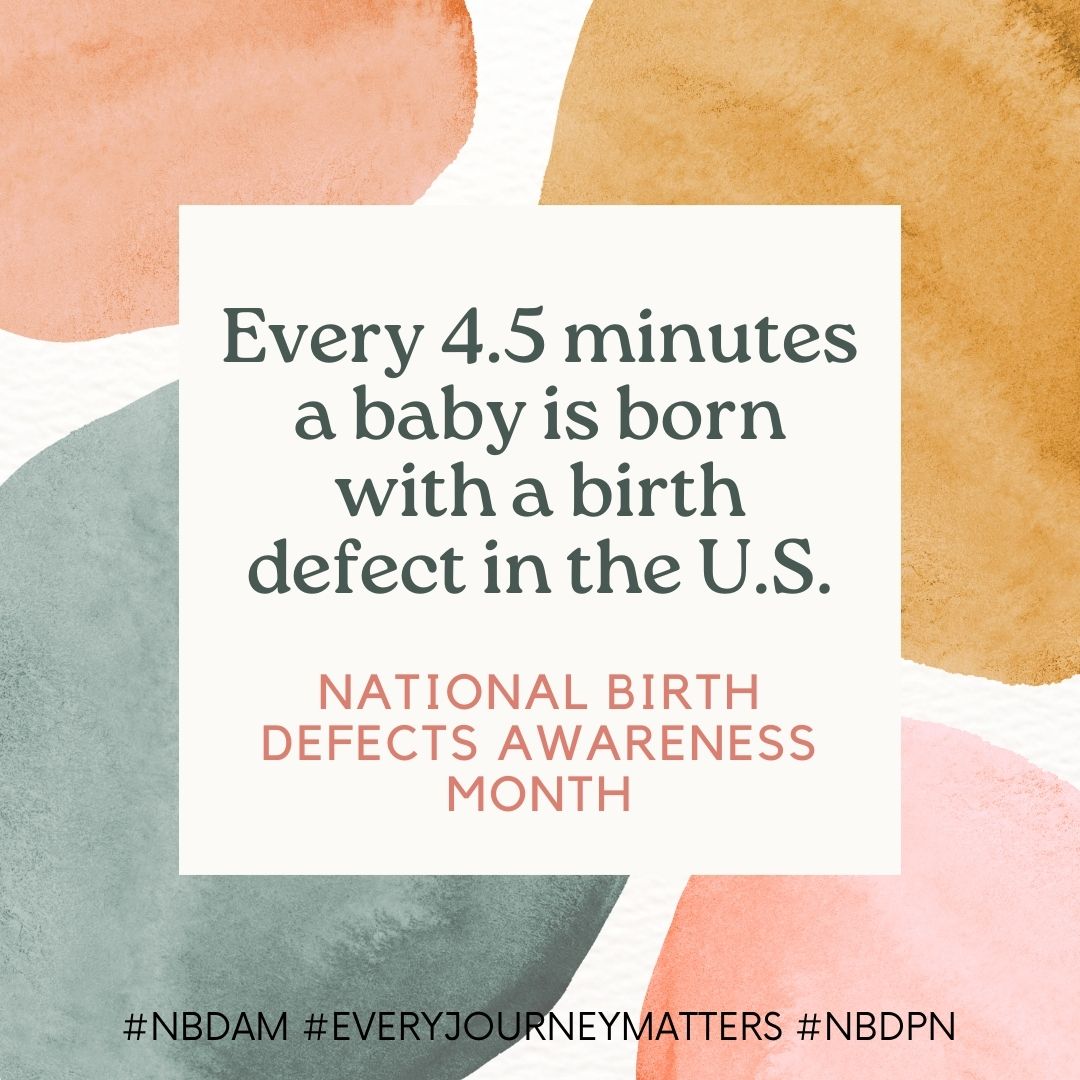
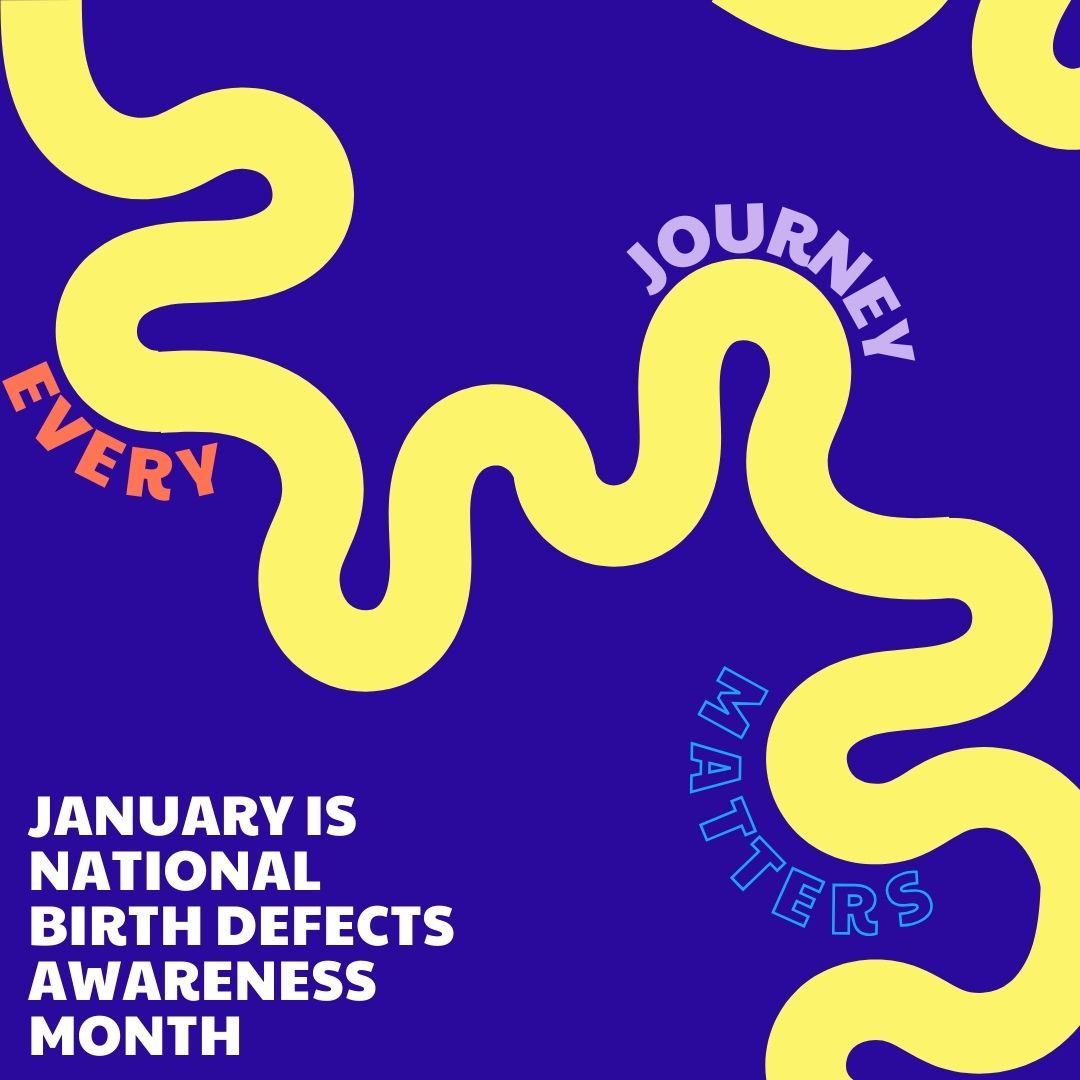
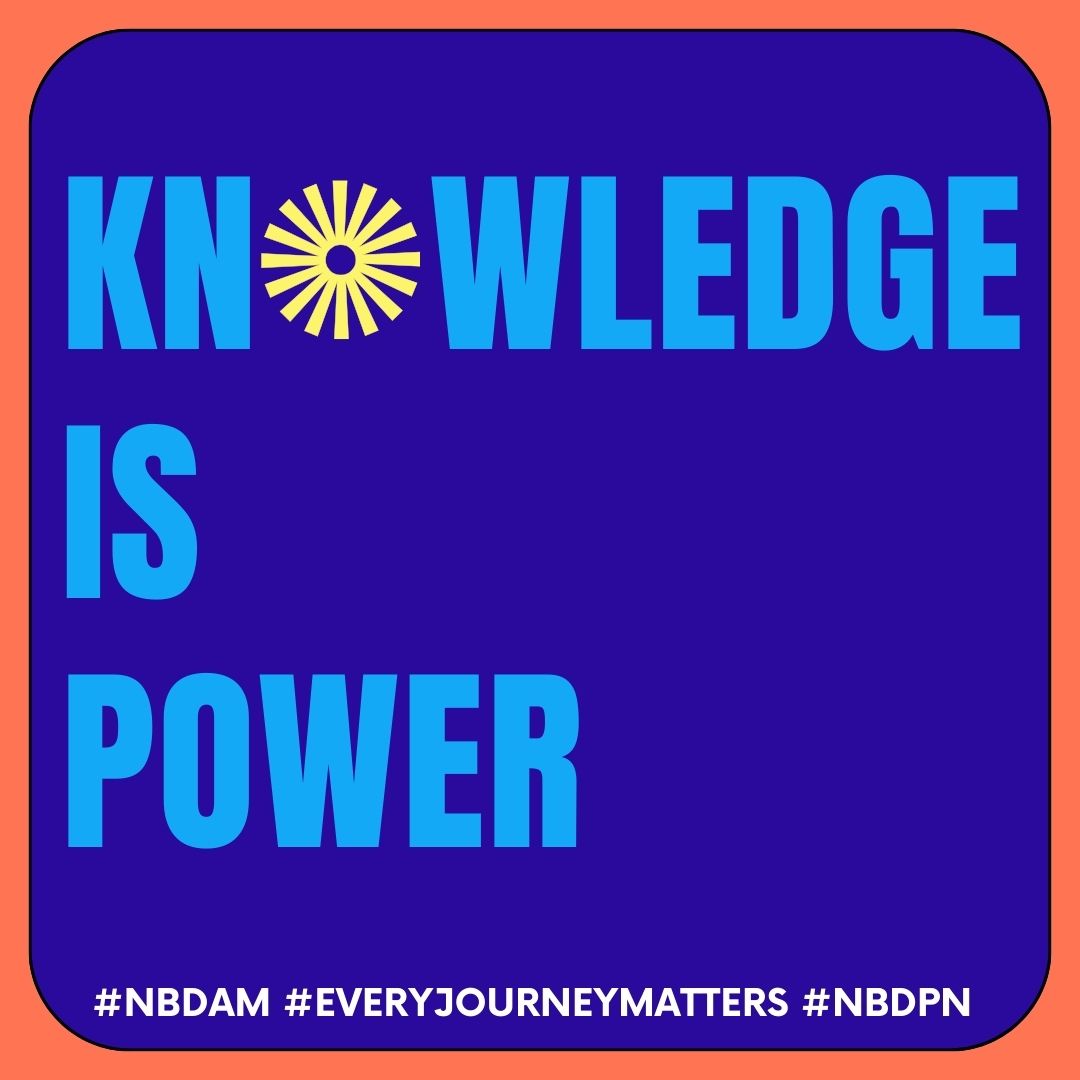
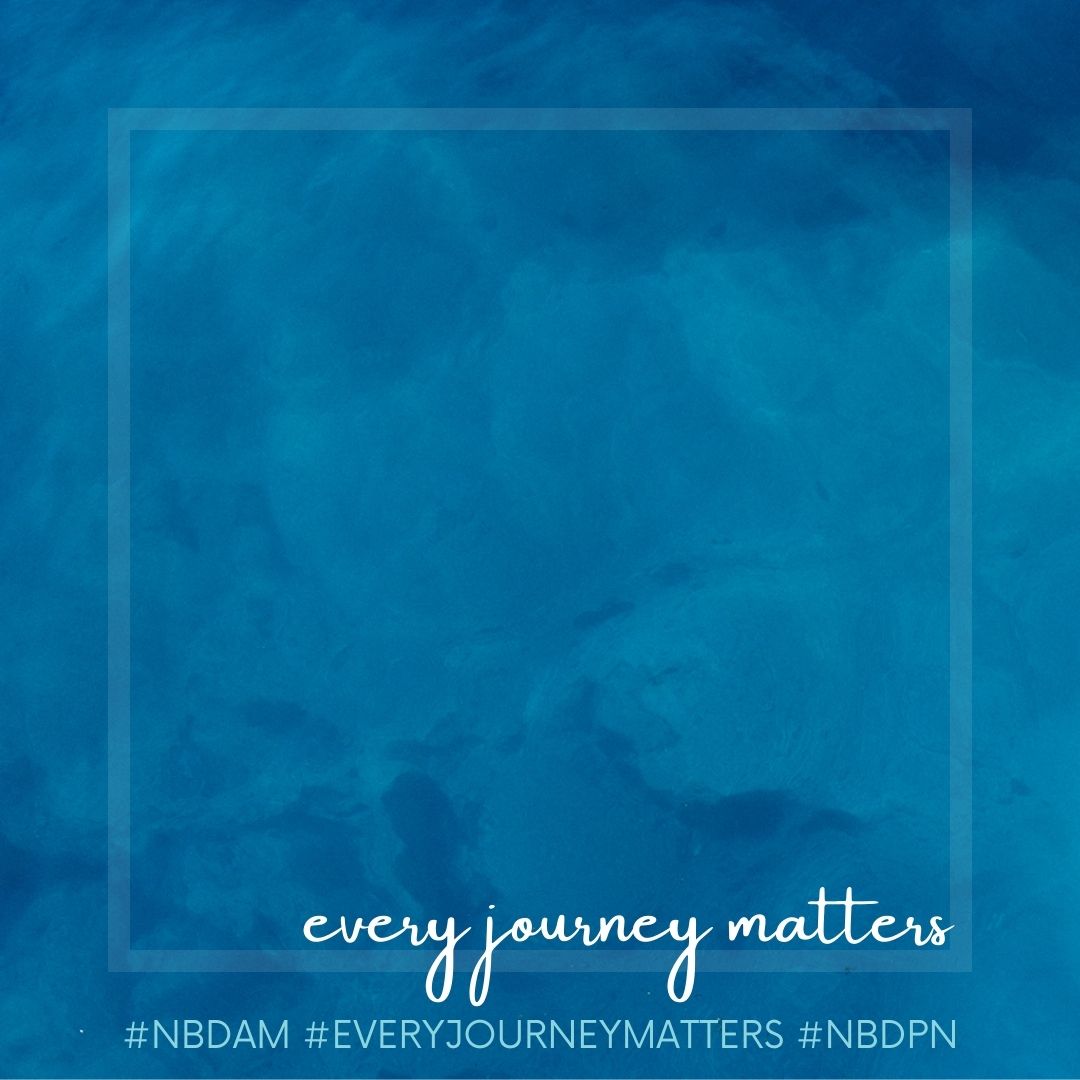
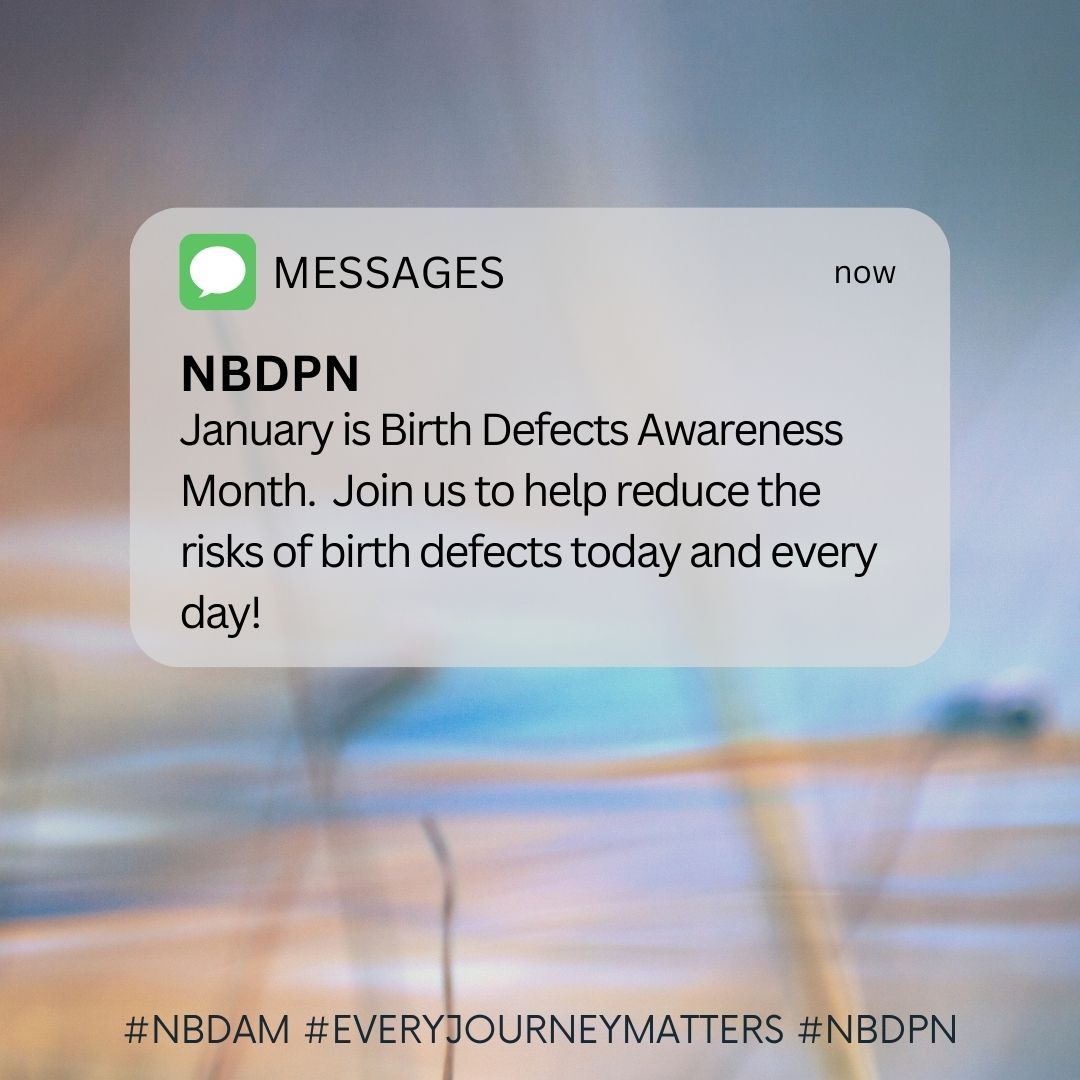
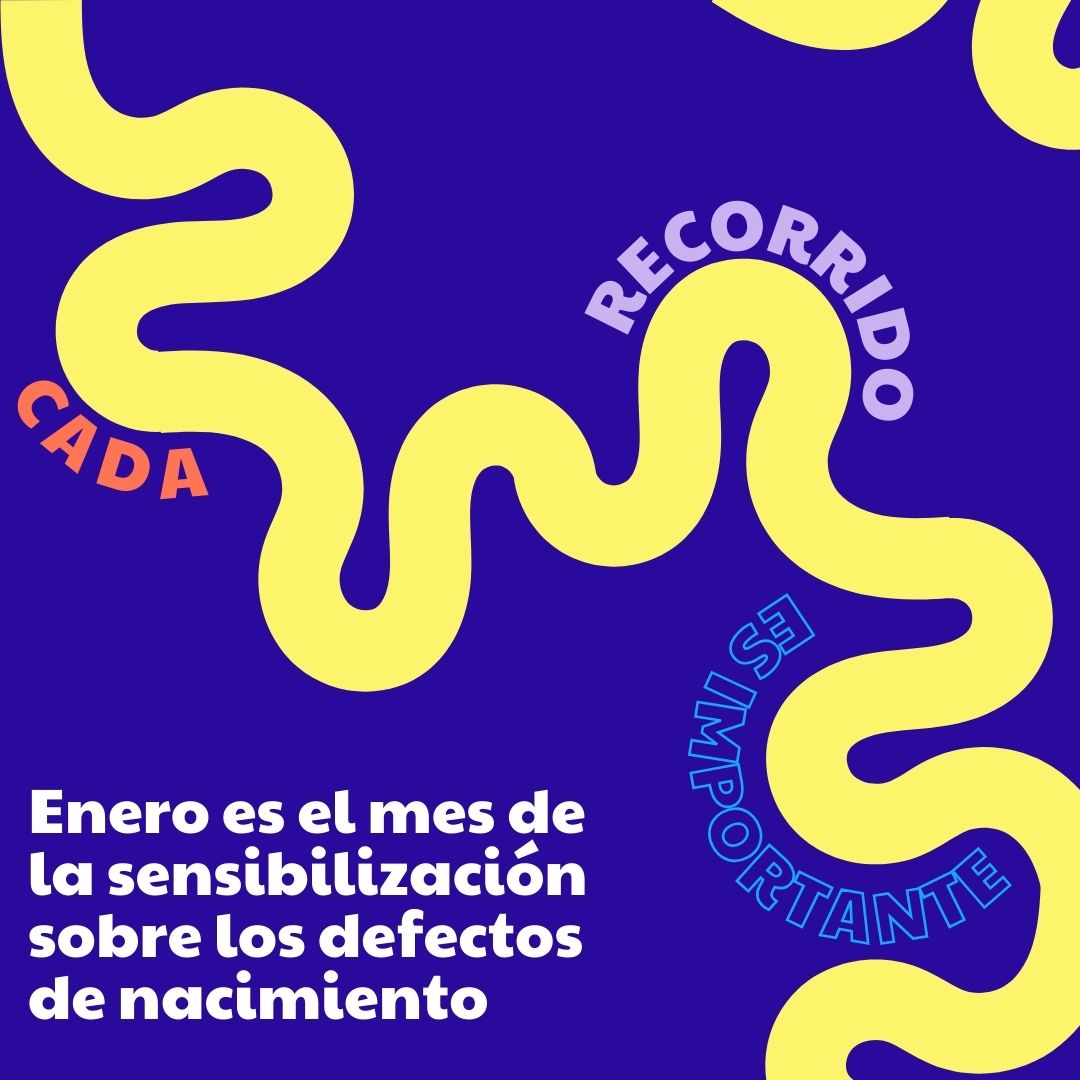
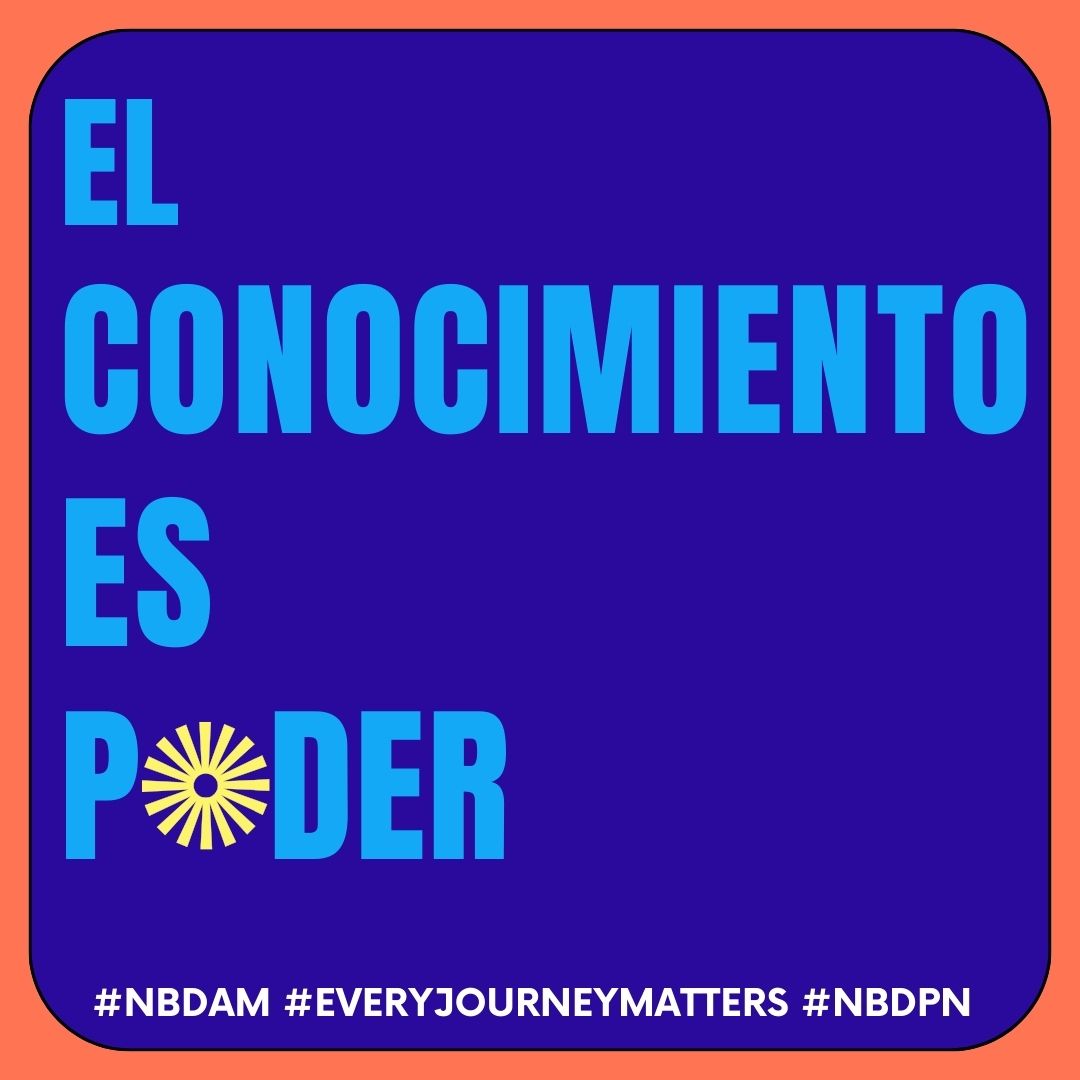
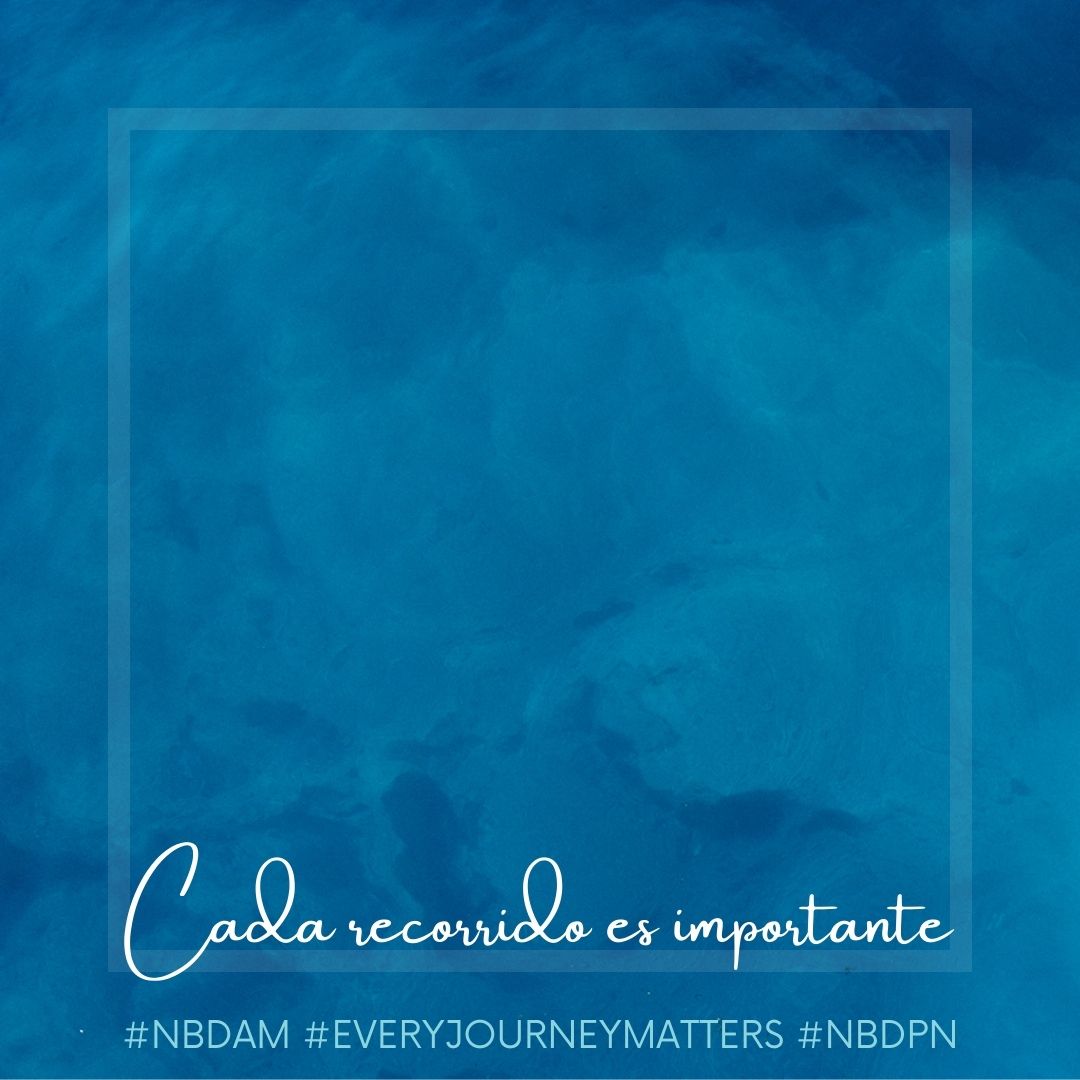
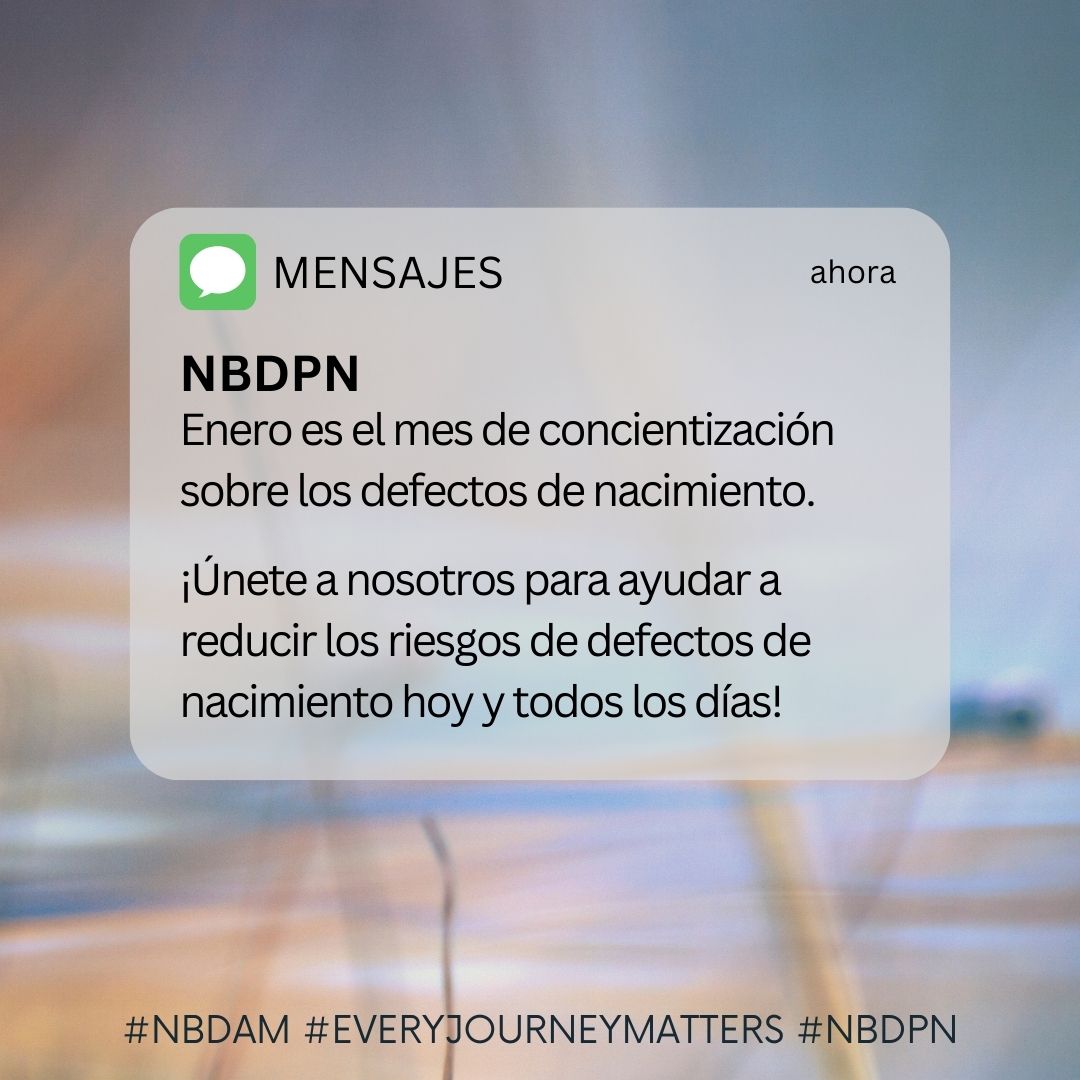
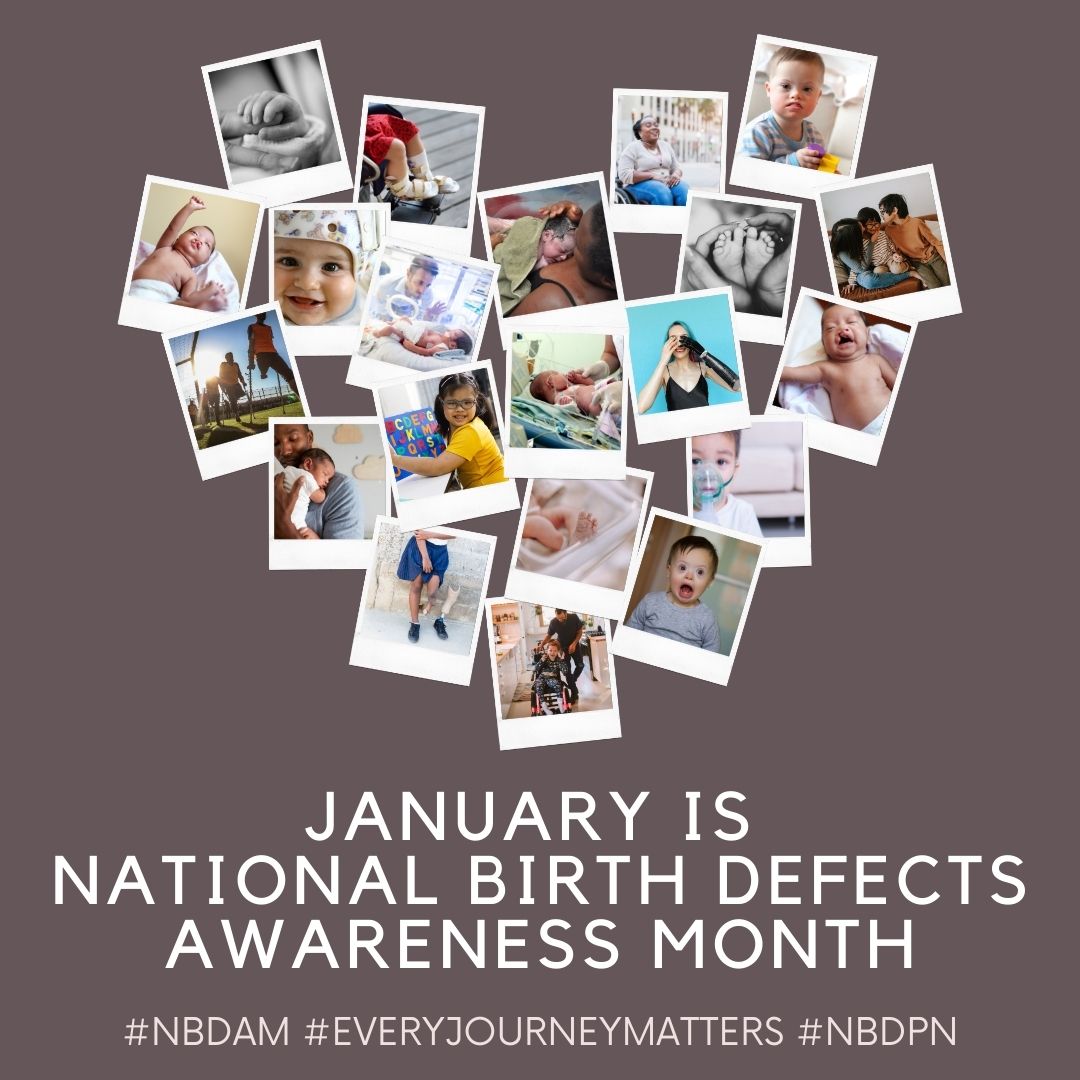
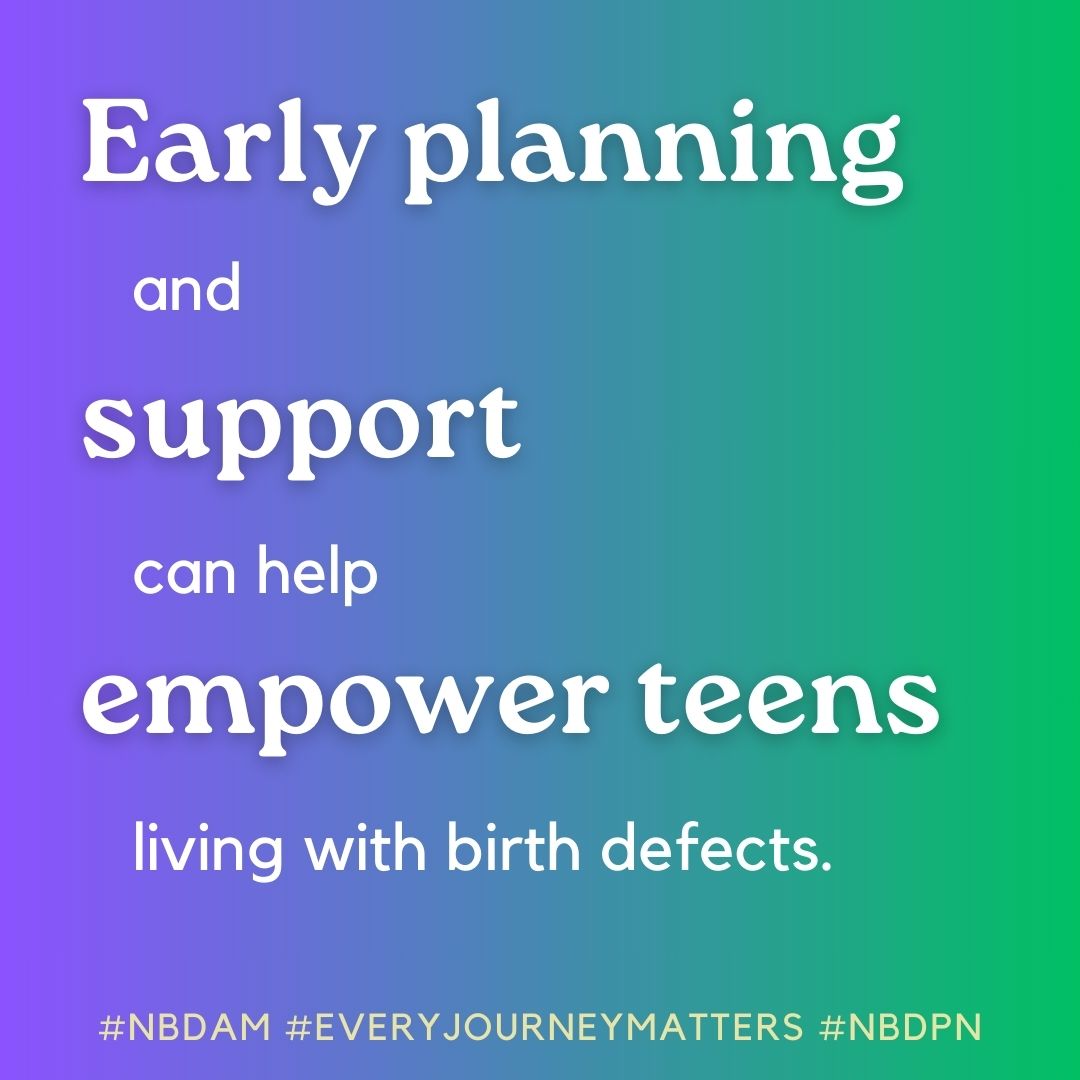
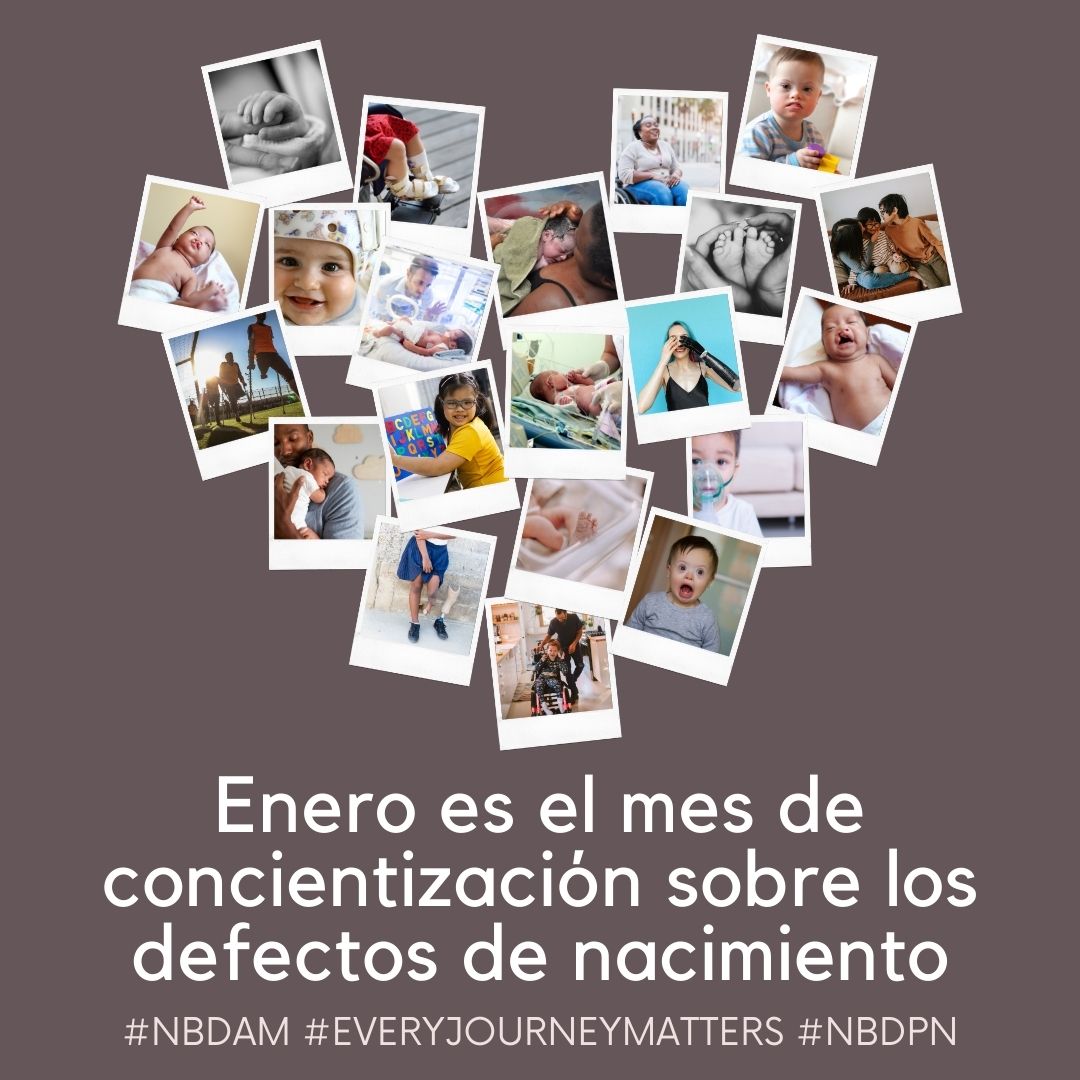
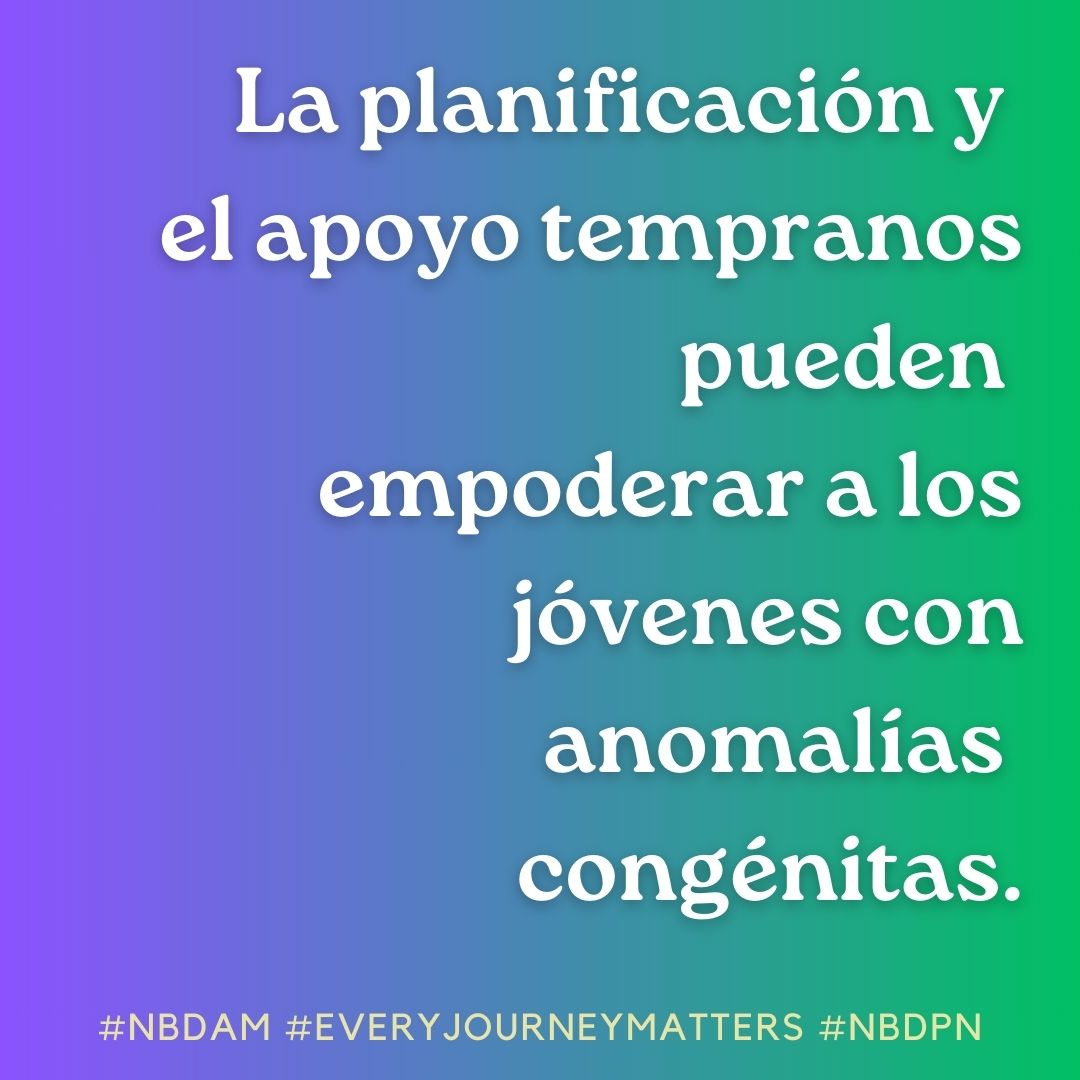
Carousel (1 of 5)
Carousel (2 of 5)
Carousel (3 of 5)
Carousel (4 of 5)
Carousel (1 of 5)
Carousel (2 of 5)
Carousel (3 of 5)
Carousel (4 of 5)
Carousel (5 of 5)
Carousel (5 of 5)
January is Birth Defects Awareness Month (BDAM). Birth defects are structural changes that can affect almost any part of the body and can cause lifelong health challenges. #NBDAM #EveryJourneyMatters
January is Birth Defects Awareness Month! While birth defect is a medical term, it doesn’t mean that an individual is defective. It refers to health conditions that develop in a baby before birth. #NBDAM #EveryJourneyMatters
¡Enero es el mes de concientización sobre los defectos de nacimiento! El termino defecto de nacimiento es un término médico, no significa que un individuo sea defectuoso. Se refiere a las condiciones de salud que se desarrollan en un bebé antes del nacimiento.
@NBDPN raises awareness of birth defects and promotes healthy pregnancy behaviors that may reduce the risk of birth defects. Birth Defects Awareness Month is a time to raise awareness and highlight efforts to improve the health of people living with these conditions across their lifespan. #NBDAM #EveryJourneyMatters
@NBDPN crea conciencia sobre los defectos de nacimiento y promueve hábitos saludables durante el embarazo que pueden reducir el riesgo de defectos de nacimiento. El mes de concientización sobre los defectos de nacimiento es un momento para crear conciencia y destacar los esfuerzos para mejorar la salud de las personas que viven con estas condiciones a lo largo de su vida.
Every 4 minutes a baby is born with a birth defect in the U.S. As medical care improves, people with birth defects are living longer and healthier lives. Recent reports show that rates of infant deaths due to birth defects have declined by 10% in the US. #NBDAM #EveryJourneyMatters
Cada 4 minutos nace un bebé con un defecto de nacimiento en los EE. UU. A medida que mejora la atención médica, las personas con defectos de nacimiento viven vidas más largas y saludables. Informes recientes muestran que las tasas de muerte infantil debido a defectos de nacimiento han disminuido un 10% en los EE. UU.
No two people living with birth defects are exactly alike. A community of support can help people with birth defects, no matter what experiences they are navigating. Everyone’s journey is unique, shaped by their specific condition, strengths, and the support system in place. #NBDAM #EveryJourneyMatters
No hay dos personas que vivan con defectos de nacimiento que sean exactamente iguales. Una comunidad de apoyo puede ayudar a las personas con defectos de nacimiento, sin importar las experiencias que estén atravesando. Cada uno es único y está determinado por su condición específica, sus fortalezas y el sistema de apoyo existente.
This year’s theme for Birth Defects Awareness Month is, Every Journey Matters. As a parent of a child living with a birth defect, Amanda Devereaux shares, Having a child with a birth defect is both challenging and rewarding. We have learned over time to parent the child we have, and not the child we expected! #NBDAM #EveryJourneyMatters
El tema de este año para el mes de concientización sobre los defectos de nacimiento es cada recorrido importa. Como madre de un niño que vive con un defecto de nacimiento, Amanda Devereaux comparte: Tener un hijo con un defecto de nacimiento es a la vez desafiante y gratificante. ¡Hemos aprendido con el tiempo a criar al niño que tenemos y no al niño que esperábamos!
@NBDPN recognizes that not all birth defects can be prevented; however, research shows that certain behaviors and health choices can reduce the risk of having a baby born with a birth defect. For more information on the prevention of birth defects visit: https://www.cdc.gov/ncbddd/birthdefects/prevention.html #NBDAM #EveryJourneyMatters
@NBDPN reconoce que no todos los defectos de nacimiento se pueden prevenir; sin embargo, los estudios muestran que ciertos hábitos y decisiones de salud pueden reducir el riesgo de tener un bebé con un defecto de nacimiento. Para obtener más información sobre la prevención de defectos de nacimiento, visite: https://www.cdc.gov/ncbddd/birthdefects/prevention.html
There is hope for a healthier future. Join @NBDPN and partners in improving health in your community. Share tools from the NBDPN education and awareness packet here: https://bit.ly/3xeN12U. Thank you in advance for promoting these tips for National Birth Defects Awareness Month! #NBDAM #EveryJourneyMatters
Hay esperanza de un futuro más saludable. Únase a @NBDPN y sus socios para mejorar la salud en su comunidad. Comparta herramientas del paquete de educación y concientización de NBDPN aquí: https://bit.ly/3xeN12U. ¡Gracias de antemano por promover estos consejos para el mes nacional de concientización sobre los defectos de nacimiento!
Knowledge can empower parents to make the best informed choices for their child’s future. Understanding your child's condition is essential to making informed decisions about their health and well-being. Early identification and early intervention also can help your child receive the right care and resources they need to thrive. #NBDAM #EveryJourneyMatter
El conocimiento puede empoderar a los padres para que tomen las mejores decisiones para el futuro de sus hijos. Comprender la condición de su hijo es esencial para tomar decisiones sobre su salud y bienestar. La identificación e intervención temprana también pueden ayudar a que su hijo reciba la atención adecuada y los recursos que necesita para prosperar.
Adolescents and young adults living with birth defects may face unique challenges as they grow older. Navigating the shift from pediatric to adult health care may feel challenging, but early planning and support can empower teens. #NBDAM #EveryJourneyMatters
Durante el crecimiento de los adolescentes y adultos jóvenes con defectos congénitos, se pueden afrontar desafíos. Navegar por el cambio de la atención médica pediátrica a la atención médica para adultos puede parecer un desafío, pero la planificación y el apoyo pueden empoderar a los adolescentes.
Community plays an integral role in the lives of individuals and families affected by birth defects. For families navigating this journey, connecting with others who share similar experiences can be a helpful source of support, advice, and understanding. This connection may be in person or through internet groups hosted by condition-specific organizations. #NBDAM #EveryJourneyMatters
La comunidad desempeña un papel integral en las vidas de personas y familias afectadas por defectos de nacimiento. Conectarse con otras personas que comparten experiencias similares puede ser una fuente útil de apoyo, consejo y comprensión. Esta conexión puede ser en persona o a través de grupos en el internet que son organizados por organizaciones enfocadas en ciertas condiciones.
Disability inclusion means understanding the relationship between the way people function and how they can participate in society, and making sure everybody has the same opportunities to participate in every aspect of life to the best of their abilities and desires. Every community member can make a difference and play a part to help create a place where everyone knows that they belong. #NBDAM #EveryJourneyMatters
La inclusión de la discapacidad es, comprender la forma en que las personas funcionan y como pueden participar en la sociedad y asegurándose que todos tangan la misma oportunidad para participar en todos los aspectos de la vida a base de sus deseos.
Not all birth defects can be prevented. However, there are steps you can take to help you and your baby be as healthy as you can be. #NBDAM #EveryJourneyMatters
Get 400 micrograms (mcg) of folic acid every day.
Try to prevent infections.
Get recommended vaccines.
Wash your hands.
Get tested for sexually transmitted infections.
See a healthcare professional regularly.
Talk to a healthcare professional about taking any medications.
Avoid alcohol, tobacco, and other recreational drugs.
No todos los defectos de nacimiento se pueden prevenir. Sin embargo, hay medidas que puede tomar para ayudarle a usted y a su bebé a estar lo más sanos posible.
Consuma 400 microgramos (mcg) de ácido fólico todos los días.
Intente prevenir infecciones.
Obtenga las vacunas recomendadas.
Lávese las manos.
Hágase la prueba de infecciones de transmisión sexual.
Consulte a un médico con regularidad.
Hable con un médico acerca de tomar cualquier medicamento.
Evite el alcohol, el tabaco y otras drogas recreativas.
*These resources have been developed by the National Birth Defects Prevention Network, in collaboration with the Centers for Disease Control and Prevention (CDC), the Society for Birth Defects Research and Prevention (SBDRP), American Academy of Pediatrics (AAP), MotherToBaby (MTB), March of Dimes (MOD), and various state health departments across the country.
We utilize the term birth defects to state that a child has a medical, anatomical, and biological difference or anomaly. Children with birth defects and their families face very unique and sometimes difficult challenges. However, there are also many positive and beautiful moments parents share with their child. Depending on the condition, children living with birth defects can do what other children do. It just may look a little different or take a bit longer. Birth defect terms can feel like labels and may seem upsetting. On the other hand, using these terms can help parents and families access the right type of care, referral to services, and find other families with similar challenges.
These resources and activities are meant to assist state program staff, individual members of the public, and any and all other parties interested in joining us during National Birth Defects Awareness Month. Together, we hope to raise awareness about the impact of birth defects on our communities and to share our best tips and resources for preventing birth defects.
If you are looking for any of our previous Birth Defects Awareness Month toolkit resources, please refer to the page linked here.